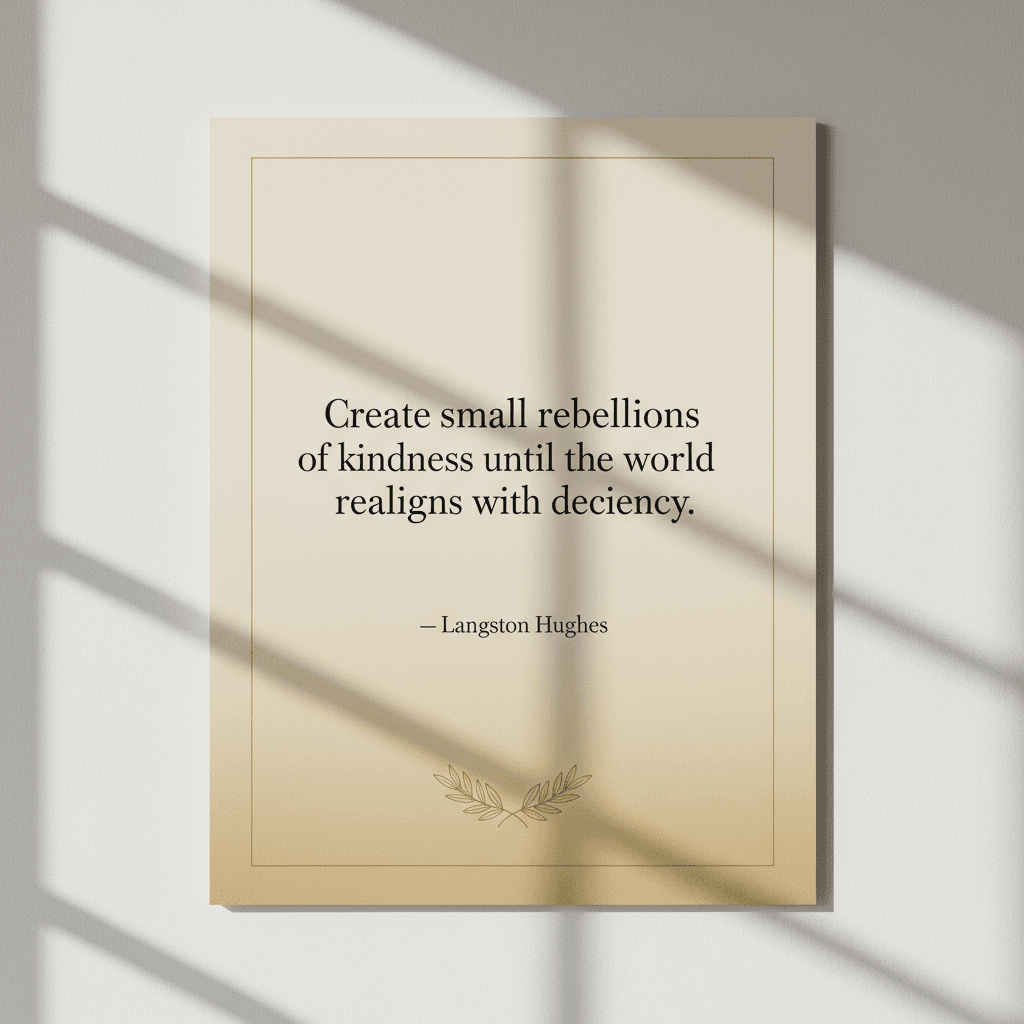Kindness as Rebellion: Realigning the World's Decency

Create small rebellions of kindness until the world realigns with decency. — Langston Hughes
The Strategy of Gentle Defiance
To begin, the phrase “small rebellions of kindness” reframes care as a subversive practice. It is not politeness for its own sake, but deliberate tenderness aimed at interrupting cycles of contempt. Each considerate gesture resists the ambient pressure to harden our hearts; in this way, kindness functions like civil disobedience of the soul. While one act may seem inconsequential, repetition turns mercy into a habit and, eventually, a norm. Thus the strategy emerges: by seeding daily life with humane micro-acts, we loosen cruelty’s grip and prepare the ground for collective change.
Hughes’s Insurgent Dignity
In Langston Hughes’s world, dignity itself is a quiet revolt. His poem I, Too (1926) insists, “They’ll see how beautiful I am / And be ashamed,” modeling a refusal to mirror humiliation. Likewise, Let America Be America Again (1935) pleads for the nation to become its best self—a radical kindness that tells the truth without surrendering hope. Even the wry humanity of Jesse B. Semple in Simple Speaks His Mind (1950) shows courtesy wielded as critique. Through such voices, Hughes suggests that decency, practiced stubbornly and publicly, can shame injustice into retreat while inviting others into a broader moral horizon.
Nonviolence as Polite Courage
Extending that spirit, the civil rights movement staged kindness as tactic. In the Nashville sit-ins (1960), students trained by James Lawson Jr. dressed neatly, requested service with “please,” and refused retaliation—disciplining empathy under duress. During the Montgomery bus boycott (1955–56), neighborly carpools and church ride lists turned logistics into solidarity, making everyday care a lever against segregation. Such actions countered dehumanization with composure, exposing brutality as the outlier. Courtesy, then, was not capitulation; it was moral jiu-jitsu, redirecting the force of hatred to reveal its imbalance and, in time, to reset communal expectations.
How Kindness Cascades Through Networks
Moreover, social science shows that small benevolences scale. In public-goods experiments, generosity spreads across networks up to three degrees, as Fowler and Christakis report in PNAS (2010)—one person’s contribution nudges friends, who nudge their friends. Organizational research echoes this: Mary Rowe’s “micro-affirmations” (MIT, 2008) describes tiny, consistent recognitions—crediting ideas, learning names, making room at the table—that counter micro-inequities and change climates. Because norms are contagious, repeated acts of fairness accumulate into shared expectations. In this light, kindness is infrastructural: a series of subtle reinforcements that rewire what groups perceive as normal, necessary, and possible.
A Playbook for Everyday Insurgency
Building on this evidence, the practice can be concrete: refuse demeaning jokes and offer an alternative; greet custodial staff by name; write the clarifying, generous email; credit colleagues publicly; keep a community-fridge stocked; set aside a “caffè sospeso” for a stranger, reviving the Neapolitan custom. When conflict erupts, begin with curiosity: “Help me understand how you see this,” then pair truth with repair. Patterns matter more than heroics; rituals of decency, repeated across days and rooms, create dependable signals that others can mirror. Thus the rebellion grows—not louder first, but wider, until even skeptics find themselves practicing it.
From Sparks to Structures
Ultimately, realignment requires institutions to catch up with conscience. Small acts can be codified: transparent credit-sharing in syllabi and project charters; community funds for mutual aid; restorative processes that center repair over spectacle. Healthcare offers a model in Schwartz Rounds (since the 1990s), where caregivers reflect on the emotional dimensions of care, normalizing compassion as professional practice. As norms harden into policy, they, in turn, protect future acts of kindness—creating a feedback loop from spark to structure. In this way, the world does not flip overnight; it clicks, steadily, into decency.